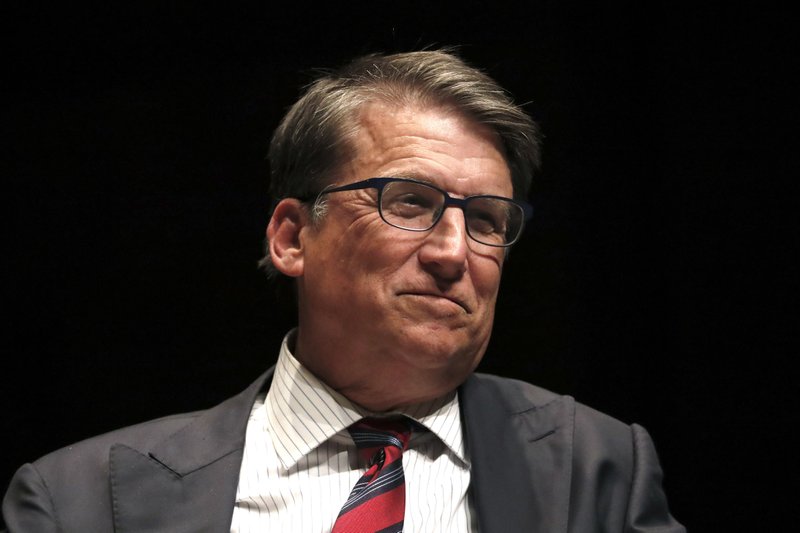North Carolina governor Pat McCrory talked about the controversial House Bill 2 on NBC’s Meet The Press Sunday.
Chuck Todd, host of the show, asked McCrory whether or not he had spoken with any transgender people before he signed the law. McCrory said he had not.
“But I’ve met with transgender people in the past and have met with them since and have had very positive conversations,” he said.
Over the past few weeks many have called for North Carolina to repeal the bill, but for the most part McCrory said he expects the bill to stay in place.
“There is one part of the bill I disagreed with before I signed it,” he said. “And that is not able to sue in state courts and that needs to be repealed. It was very poorly thought out.”
The bill requires transgender people to use the bathroom of the gender on their birth certificate, as well as prevents local governments from creating minimum wage laws and removes legal protections from some minority groups.
McCrory said the part of the bill concerning bathroom privacy will not be repealed, despite Todd saying over 160 companies have called for the bill’s repeal.
“Any estimates of lost revenue we have so far (NBC) has come up with, a conservative calculation is $39.7 million,” Todd said. “One hundred and eighty six million dollars perhaps in revenue and some have suggested billions.”
A number of celebrities and musicians have canceled appearances in the state.
Even with the growing number of people and groups who have come out against the legislation, McCrory said he felt there was a disconnect between businesses and the citizens of North Carolina.
He mentioned a recent visit to Hamlet, North Carolina.
“I walked into a buffet restaurant, African-American buffet restaurant and the people welcomed me with open arms and said ‘thanks for protecting us,'” McCrory said. “I got back to my car and got a call from someone in corporate America saying ‘man you’ve got to change this we’re getting killed.'”
McCrory said he wanted to have dialogue moving forward.
“This was basically a restroom privacy issue versus equality,” he said. “These things need to be discussed, not threatened by Hollywood or anyone.”
https://www.youtube.com/watch?v=DjbX_77e_KI
Related Stories
‹
![]()
Rallies For and Against HB 2 At Start of Legislative SessionSupporters and opponents of House Bill 2 rallied in Raleigh on Monday on the first day of the General Assembly’s legislative session. The Forward Together Moral Movement, together with the NAACP, organized a rally against House Bill 2, which pulls back legal protections for the LGBT community in the state. LGBT advocates held a press […]
![]()
Obama Calls For Repeal Of House Bill 2The growing list of people who have called for the repeal of House Bill 2 just added its biggest name yet — President Barack Obama. “The laws that have been passed (in North Carolina) are wrong and should be overturned,” he said. A number of local governments, businesses and public figures have already called for the […]
![]()
Civil Rights Groups File Lawsuit Against House Bill 2Advocates have been speaking out against House Bill 2, and now that bill will be challenged in court. The American Civil Liberties Union in North Carolina, Lambda Legal and Equality NC held a press conference Monday announcing a federal lawsuit challenging House Bill 2, which rolls back protections for the LGBT community. Chris Brook is the […]

Health Experts, Orange County Officials Share Concern for LGBTQ Wellbeing in Wake of NC BillsThe passage of two bills by the North Carolina General Assembly has drawn condemnation from some elected bodies in Orange County and local pediatric health experts alike for their anti-LGBTQ+ elements. The bills’ sponsors say the elimination of gender-affirming medical care for those under 18, as well as the requirement of educators to alert parents […]

Former North Carolina Gov. McCrory Enters U.S. Senate RaceWritten by GARY D. ROBERTSON Former Republican Gov. Pat McCrory on Wednesday announced he’ll run for the U.S. Senate in North Carolina, shaking up the calculus in the expanding field to succeed retiring Sen. Richard Burr with the entrance of a veteran of statewide politics. McCrory, who served as governor for four years through 2016, revealed […]
![]()
Orange County Governments to Vote on LGBTQ Anti-Discrimination LawsFollowing the expiration of a three-year state ban blocking those protections, local governments in Orange County will consider adopting new safeguards against LGBTQ discrimination at their respective meetings this week.

Transgender Community, Advocates Look to Expiration of NC Law As Chance for Local ChangesNorth Carolina's HB142 had one provision against nondiscriminatory laws expire Tuesday. Members of the LGBTQ community now see it as a chance for change.
![]()
McCrory Won't Run for NC Governor, Will Consider Senate BidFormer North Carolina Gov. Pat McCrory announced Thursday that he won’t try to recapture his old office in 2020, but will continue to consider a U.S. Senate bid in 2022. The Republican revealed his decision on his morning radio program in Charlotte, where he served as mayor for a record 14 years. McCrory had said […]
![]()
'Bathroom Bill' Fallout: North Carolina to Lose Netflix ShowThe lingering fallout from North Carolina’s controversial “bathroom bill” may force a new Netflix series about the state’s Outer Banks to film in South Carolina. Show creator Jonas Pate tells The StarNews of Wilmington that Netflix has picked up “OBX,” with filming slated to begin this spring. He says the streaming service passed on filming in North […]
![]()
Judge Mulls Letting Bathroom Bill Fight ProceedA federal judge needs time to consider whether transgender plaintiffs can proceed with a lawsuit challenging a North Carolina law that replaced the state’s “bathroom bill.” U.S. District Judge Thomas Schroeder heard arguments Monday over a request by Republican lawmakers to dismiss the lawsuit. He said at the end of the hearing that he would […]
›




